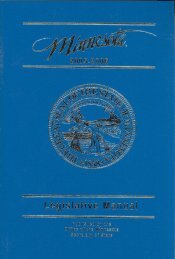Consultant's Report - Minnesota State Legislature
Consultant's Report - Minnesota State Legislature
Consultant's Report - Minnesota State Legislature
Create successful ePaper yourself
Turn your PDF publications into a flip-book with our unique Google optimized e-Paper software.
MINNESOTA DEPARTMENT OF NATURAL RESOURCES<br />
Feasibility Study to Limit the Spread of Zebra Mussels from Ossawinnamakee Lake<br />
zebra mussel production (Stewart and Haynes 1994). Within Lake Erie (Dermott et al. 1993)<br />
and Lake St. Clair (Griffiths 1993), these populations of benthic invertebrates have increased<br />
proportionately with zebra mussels.<br />
Diving Waterfowl<br />
Diving waterfowl have been known to prey on zebra mussels within North America. The<br />
following species have been observed feeding extensively on zebra mussels in Ontario and<br />
throughout the Lake Erie region: greater scaup, lesser scaup, common goldeneye, and the<br />
bufflehead (Wormington and Leach 1992, Hamilton et al. 1994).<br />
Aquatic Nuisance Species (ANS)<br />
Nonindigenous species (NlS), also called exotic, alien or nonnative species, are generally<br />
referred to as those plants and animals that are found beyond their natural geographical ranges<br />
(US Congress, OTA 1993). It is estimated that as many as 50,000 nonindigenous species (plants,<br />
animals, invertebrates, microbes, etc.) have been introduced into the United <strong>State</strong>s (pimentel et<br />
al. 2000). Not all nonindigenous species are harmful; some are beneficial including many food<br />
crops (US Congress OTA 1993, Pimentel et al. 2000). In more specific terms, an invasive<br />
species is one category ofnonindigenous species that is defined as 1) non-native (or alien) to the<br />
ecosystem under consideration and 2) whose introduction causes or is likely to cause economic<br />
or environmental harm or harm to human health (Executive Order 13112 1999). Invasive<br />
species can cause direct harm to species and habitat by directly competing for resources and<br />
competitively interacting with native, indigenous species. Additionally, invasive species can<br />
result in indirect impacts to species and the general ecology of a system such as the Upper<br />
Mississippi River Basin (UMRB). In either case, the impacts are often irreversible and costly.<br />
In a 1993 study produced by the United <strong>State</strong>s Congress, Office of Technology Assessment, it<br />
was estimated that 79 nonindigenous species had caused approximately $97 billion in damages<br />
from a period of 1906 to 1991. However, more current estimates indicate that some<br />
nonindigenous species in the United <strong>State</strong>s may cause as much as $137 billion of damage per<br />
year (Pimentel et al. 2000).<br />
Most plant and vertebrate introductions were intentional, compared to invertebrate and microbe<br />
introductions that are mainly unintentional (Pimentel et al. 2000). Although intentional, not all<br />
introductions were malicious attempts to directly alter ecosystems but rather attempts to<br />
biologically control or enhance environments. Despite the introduction intentions, some<br />
nonindigenous species are spreading at alarming rates and threaten ecologically significant areas<br />
such as the Upper Mississippi River Basin.<br />
A sub-classification of invasive species are the Aquatic Nuisance Species (ANS) described as<br />
nonindigenous species that threaten the diversity or abundance of native species; the ecological<br />
stability of infested waters; or commercial, agricultural, aquacultural and recreational activities<br />
dependent on waters (ANS 2000). The threat of ANS has prompted action at local, state and<br />
federal levels. In 1990, The Nonindigenous Aquatic Nuisance Prevention and Control Act<br />
IV-16 Review of Zebra Mussel (Dreissella polymorpha) Species
















